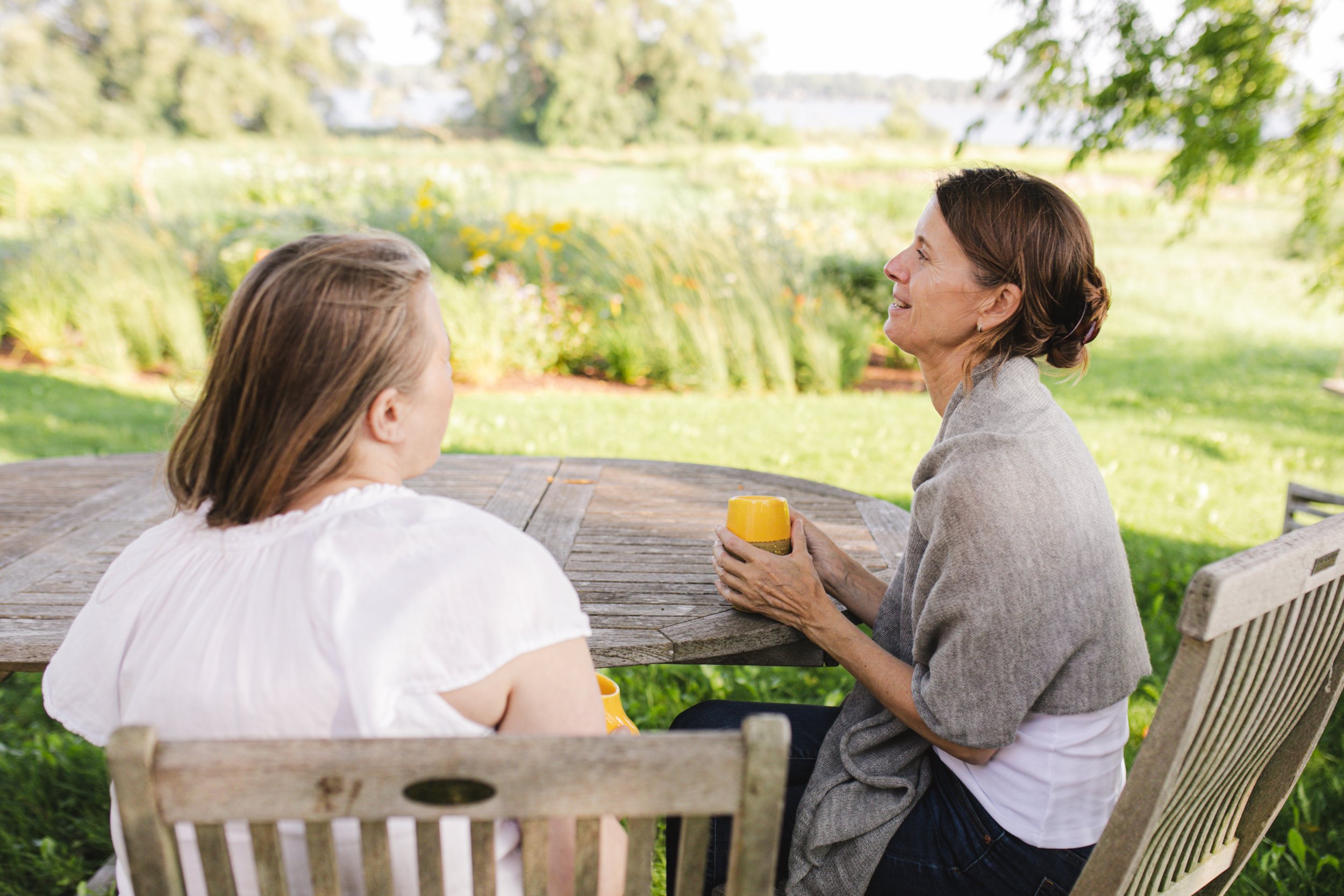
About Mindfulness and Psychotherapy
approach & values
I am an Ontario based psychotherapist teaching mindfulness both as a tool for relieving discomfort, and as a way of bringing meaning and hope to everyday life.
My clinical practice combines two loves: teaching and psychotherapy for the sake of radical transformation. I am deeply committed to helping individuals, and care providers, including health care professionals, care wisely for themselves and others, across the lifespan.
I am particularly passionate about working with parents, young adults navigating emotional and financial independence, anyone needing support to care for themselves while caring for others, and anyone facing issues related to accident, disease or end-of-life including medical decision making, VSED, and MAID.
The individuals I work with value community and want to make a positive impact in the world. They are mindful of time and want to focus their energy on things that matter. They want to feel fulfilled and at peace within their relationships, and to know a sense of freedom with who they are and what they have to offer. They want support in resisting chronic busyness, and to help others from a well grounded place of wisdom. They want to be adults that younger people will turn to rather than avoid. And they want to have fun.
I am also available to consult with therapists, physicians and teachers who are sharing mindfulness with patients, clients and students but don’t have a meditation or mindfulness practice themselves. Sharing mindfulness from a trauma sensitive perspective and knowing signs of meditation injury are part of my ethical responsibility in sharing mindfulness and something we can help each other in ensuring. I am also available to consult with mindfulness teachers about consent, best practices around privacy and confidentiality, and when to refer. Please feel free to reach out with questions and to set up a time to connect.
What I Do and Who I Work With

I see therapy first and foremost as a practice of relationality.
New clients have typically had different degrees of exposure to mindfulness and psychotherapy. There doesn’t need to be anything critical going on for therapy to be of value; it can be a great place to bring questions and concerns and to begin thinking about what kinds of support would be helpful as you move toward the next stages of life.
By combining mindfulness training and therapy we have the freedom to explore patterns of thinking and feeling, along with behaviour, from a variety of perspectives and philosophies. This can be a beautiful way to begin exploring your inner world, as well as a way of honouring the life you’ve lived so far.
While my approach to teaching mindfulness is very secular, the language and techniques will lend themselves to any religious tenets you are wanting to work within or deepen. They can also be useful to anyone wanting to explore faith (also shown to benefit physical and mental health), spirituality, or animism.
You may have been learning about mindfulness through apps, books, and podcasts, attended classes or even retreats. Mindfulness coaching can be useful in getting a formal practice going, or creating traction and momentum with an existing practice. Learning mindfulness with a Registered Psychotherapist means having support to ensure your practice is accurately targeting your health goals, as well as personal development and happiness.
Clinical Trends
Clients can be looking for help with managing experiences of mood, anxiety, or physical and emotional pain. You may be looking to feel more present in your relationships, or wanting to expand your capacity for facing life’s challenges with more flexibility. Often, my clients want to navigate an upcoming transition with greater skill and ease.
There is a general theme in my caseload of individuals not realizing that much of their suffering is related to early (and often subtle) experiences of emotional distancing or neglect by caregivers (sometimes called attachment injury) - even when there was lots of love and more than basic needs were met. There is also a general lack of skill around self compassion and a strong tendency toward self criticism. Undiagnosed trauma and complex PTSD are also common.
At your discretion, we will explore these histories with curiosity and wisdom, and a goal of both personal and intergenerational healing. Sensitivity to trauma, privacy and confidentiality, and ongoing consent are key principles in my work.
We are mindful of the ways in which social and cultural structures impact the lived realities of individuals and communities, and are curious about how social and political resistance intersect with well-being. Everyone I work with cares deeply about their community and is looking to be of service in the world.
Non-Dualism
While I am happy to work with and support experiences of non-dualism, my greatest joy lies in helping you apply your growing capacity for skilled consciousness to areas of life that promise the greatest fulfillment, including relationships and vocational stewardship. I see emotions, impulses and tendencies as part of the whole that is any person’s being.
The beauty of a therapeutic relationship is that you can explore what it feels like to be seen and heard with a quality of attention you may not have otherwise known was possible.
My Practice Story
I’ve been practicing insight meditation for more than 10 years and have hundreds of hours of silent residential retreat experience. The gift of these years has been to realize the immense value of being able to pause and listen. As someone who derives a great deal of satisfaction from being productive it took a while for me to realize that being still (something I had no patience for and often found impossible), can have a profound impact on my sense of wellbeing and on the happiness of those around me.
Before starting my private practice I worked in three different hospitals as a multi-faith spiritual care provider supporting patients, families, and staff facing major life changes related to acute and chronic physical and mental illness, accident, and end-of-life. For me, spiritual health is about being able to explore experiences that don’t make sense or that are unwanted, from a place of honesty, vulnerability, and humility. For some people this will include being curious about God or creation. For others the journey will be more humanistic, existential or metaphysical in nature. Being with others as they discover some sense of okayness and even beauty amidst grief, or peace amidst tragedy has been one of the many privileges of my lifetime.
Over those years, mindfulness became a useful language both personally and professionally for working with the experience of change - both sudden and slow. Bodies change. Minds see things differently over time. Seasons unfold. People come and go. I teach from the perspective that curiosity, creativity, wisdom and compassion are the roots of vitality, and love working with anyone keen to nurture a sense of aliveness, flow and ease through contemplative practice. More of Kara’s perspective on mindfulness can be found here.
I have a Master of Theological Studies specializing in Spiritual and Religious Care in a Pluralist Society, and did 1600 hours of supervised clinical training through the Canadian Association of Spiritual Care: of which I am a member (along with the Canadian Counselling and Psychotherapy Association) and whose codes of ethics I abide by. I did not grow up in the church and do not belong or identify with any particular religious or faith community.
As well as being an Ontario Certified Teacher and Registered Psychotherapist I am a mother, and writer. My practice is small so that I can bring my best self to clients, and show up in all the other places that matter to me: ongoing professional development, being available to family, friends and neighbours, and travelling to new places whenever I can. I try to bring a gentle yet firm quality of attention, enthusiasm and playfulness to all of these spaces.
I’m a member of the College of Registered Psychotherapists of Ontario, based in Canada, and work exclusively online.

Mindfulness and Psychotherapy: Preventative Health Care
How I Got Here
In my early 20s, I had a strong sense that I would end up in therapy someday. I didn’t know why or what for; it was more of an awareness that there was something to be better understood or integrated. It would be several more years before I acted upon this curiosity, and I’ve often reflected that it would have been great if there had been opportunities or invitations to talk and share some of what was going on in my life, either from teachers or counsellors, much sooner. Again, I wouldn’t necessarily have thought there would be much to talk about. I didn’t feel depressed or anxious. Many of my clients say this, in fact, at the beginning of therapy, that they had no idea they would have so much to share. And they are surprised by what it can feel like to be the object of someone’s undivided attention.
MBSR (Mindfulness Based Stress Reduction) was my introduction to meditation, and I will always be grateful for the teaching of Florence Melio-Meyer at Omega Institute in the spring of 2014. That retreat was my first experience of being in silence, and it was from there that I came to experience the impact of meditating on my own (no external guidance) for just ten minutes a day. Shinzen Young and Unified Mindfulness have been my greatest inspiration in finding a language with which to share my love of mindfulness with others. Even more importantly, Shinzen’s framework has given me a way to understand some of the more ephemeral aspects of my life, including profound experiences of being with individuals at the end of their life.
Letting mindfulness training be the focus of psychotherapy means that even if this isn’t a high-stakes moment in someone’s life, we have something to focus on and build toward. In many ways, it is filling the tank for days to come. As Shinzen often says, “The days are passing anyway, so we might as well make good use of them.”
Emergent Situations
If you or someone you know is experiencing psychological distress or has experienced injury related to a meditation or mindfulness practice, please feel free to be in touch. I will respond in as timely a manner as I am able, but should not be considered a reliable support if your situation is immediately emergent. I encourage you to trust your instincts about the type of support you or your person needs and any sense that further harm could come from a standard psychiatric response.
This being said, I would far rather you err on the side of caution and get immediate support by calling 911 or going immediately to your local Emergency Department. Please hear this with the greatest compassion for yourself and your person: we can only ever work with what is, and generally, in the long run, keeping someone safe gives us much more to work with.

Let’s chat - I’d love to get together for 30 minutes and hear what’s going on in your world. Please be in touch to schedule a time for us to connect:
kara@karabraun.health



